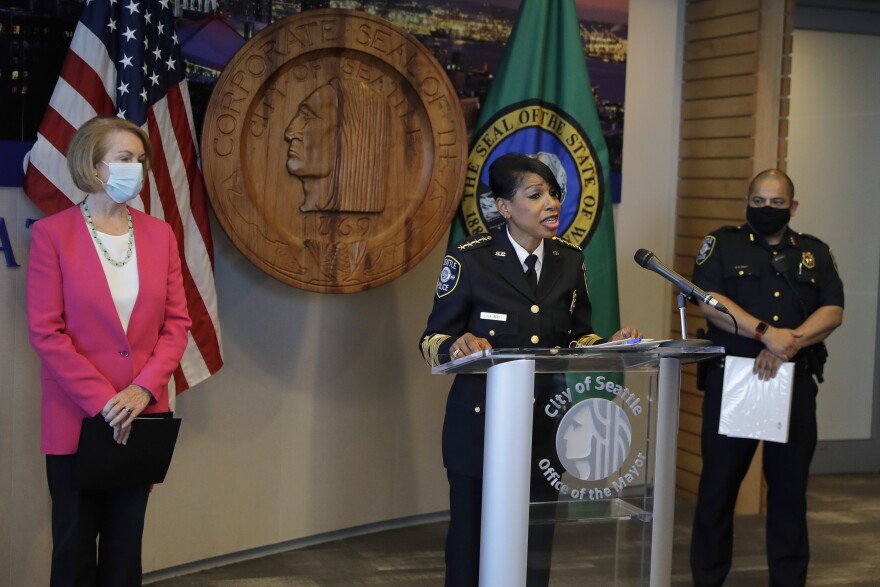The announced retirement of Seattle Police Chief Carmen Best is yet another challenge for the city, as leaders pledge to reimagine public safety in response to ongoing protests against police brutality and systemic racism.
Best confirmed Tuesday that she is retiring effective Sept. 2. Deputy Chief Adrian Diaz will take over as interim chief at that point.
The announcement came the day after the Seattle City Council voted to reduce the police budget, including cuts to the chief's salary and a plan to reduce the department by up to 100 officers through layoffs and attrition.
Mayor Jenny Durkan says she will not begin a search for a permanent chief until after the council completes its 2021 budget process later this fall.
"We have to see what the council is willing to do for this department in the long run," Durkan said at a press conference Tuesday. "Because right now, nobody would know what job they’re applying for."
KNKX Morning Edition Host Kirsten Kendrick sat down with Durkan to talk more about Best's retirement and the city budget. Listen to their conversation above or read the transcript below. Both have been edited for length and clarity.
Kirsten Kendrick, KNKX: How does the retirement of Chief Best impact the goal of reimagining policing in the city?
Jenny Durkan, Mayor of Seattle: Obviously, we are still going to move forward. I hope I can still consult with her. (Deputy Chief) Adrian Diaz will be himself a very good leader on that front. It's a deficit. Look, it's a loss to the city in many regards. And I really regret that we've lost her.
KNKX: Well, you faced criticism two years ago when Best was initially excluded from a list of finalists for the chief's job. And this week, you're speaking strongly in support of her work as chief. As you look back on that appointment process, what are your feelings about it in light of where the city is now?
Durkan: So I think I said at the time that she deserved to be on that list. She got on that list. She was chosen as chief, and she was chosen as chief because she was the right person for the job. She had earned it. And I think she proved it over the two years that she was chief, that she had earned it and that she was the right person.
KNKX: Well you were mentioning she deserved to be on the list. Why wasn't she on the initial list of finalists, then?
Durkan: So, as you know, there was a dual-track process for that. And I think it was a mistake at the time, and, fortunately, it was one we were able to correct. She competed for the job. She got the job and she proved she could do it.
KNKX: Chief Best has said her departure is tied to police budget cuts recently approved by the city council. And both you and the chief have talked about a lack of collaboration in the process. How do you plan to work with the council on this moving forward?
Durkan: I'm really hoping that we can work together. I've talked to the council president and others about doing joint community outreach and engagement so that we're hearing the same thing from all parts of the city and to have a process moving forward so we can focus it not on just the numbers and percentage of a cut, but really what are the functions that we need from a police department and what are functions we need from different types of organizations. I think if we can have that values-based discussion, that there will be a lot of agreement moving forward.
KNKX: We've also learned that the city's budget outlook is even more bleak than initially predicted — deficits of hundreds of millions of dollars this year and next. How does that factor into these public safety discussions?
Durkan: It's a huge factor in everything the city's going to be doing. We have a $50 million delta that we didn't have before: $25 million more this year and $25 million more next year. So we had to make up a $325 million budget deficit for next year. On top of that, we've got the West Seattle Bridge. We just learned that part of the waterfront pier is collapsing and failing. We've got a whole range of issues that present emergencies for the city.
I think at this moment in time, we're working as hard as we can to avoid significant layoffs or furloughs of city employees. But it's becoming increasingly a probability that we're going to have to do that. And so then that's going to be a discussion with those unions, as well as department by department, to make sure that we can still provide the basic city services that the people of Seattle expect.
KNKX: You mentioned the importance of community engagement in the budget process. How will that be different from past efforts?
Durkan: The one thing that makes engagement very, very difficult is because we're still in COVID. Before, when we did community engagement, we could go into a neighborhood or a community, meet in the community center, the library, the schools, have people together and have a longer period of time to actually discuss ideas and listen to people to do the kind of whiteboard exercises. That's much more difficult when you're doing it by Zoom meeting or online. You lose that kind of human connection in the connectivity that's so important to engagement. So I think we'll try a variety of ways to engage people because I think people communicate in so many different ways now. But I think we're gonna have to get very innovative.







